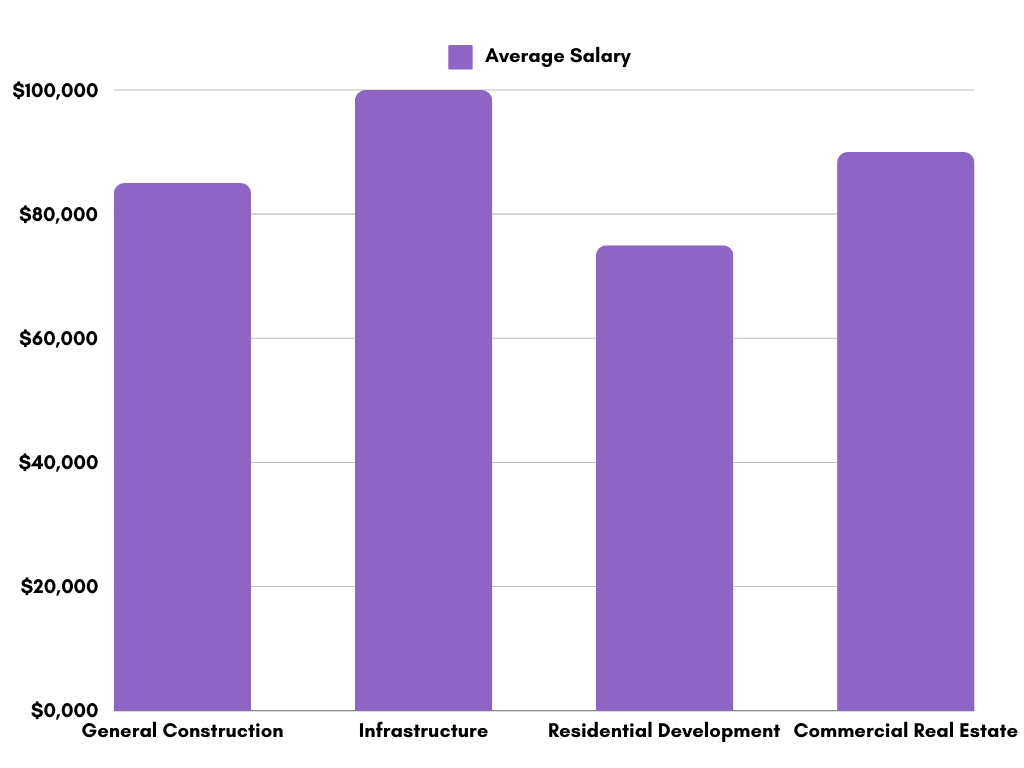
Table of Contents
The role of a construction project manager (CPM) is essential to the successful completion of construction projects. CPMs oversee all aspects of construction, including budgeting, scheduling, and team management. Understanding their salary ranges provides valuable insight for both potential candidates and industry professionals. This comprehensive article explores the average base salary for construction project managers, the factors influencing their pay, and the impact of location, experience, and education on earnings.
Construction Project Manager Salary: Average Base Salary Insights
National Salary Averages
In the United States, the average base salary for a construction project manager is approximately $85,000 per year. However, this average can vary based on numerous factors. To provide a clearer picture, let’s examine the average salary ranges by experience level:
Table 1: Average Base Salary by Experience Level
| Experience Level | Average Salary |
|---|---|
| Entry-Level | $65,000 |
| Mid-Level | $85,000 |
| Senior-Level | $105,000 |
| Executive-Level | $130,000 |
These figures illustrate the salary progression as a project manager gains more experience and takes on more complex responsibilities.
Construction Project Manager Salary: Regional Variations
Salaries for construction project managers can differ significantly across different regions in the United States. The following table highlights average salaries by region:
Table 2: Average Base Salary by Region
| Region | Average Salary |
|---|---|
| Northeast | $90,000 |
| Midwest | $80,000 |
| South | $75,000 |
| West | $95,000 |
Chart 1: Regional Salary Distribution

The chart above visualizes the salary distribution across different regions, showing the higher salaries in the Northeast and West compared to the South and Midwest.
Factors Influencing Construction Project Manager Salaries
Knowledge and Experience
A significant factor influencing the construction project manager salary is the level of knowledge and experience. Project managers who possess specialized expertise and advanced certifications can command higher salaries. For instance, construction project managers with credentials such as PMP (Project Management Professional) or CCM (Certified Construction Manager) typically earn more due to their advanced skills and qualifications.
Table 3: Impact of Certifications on Salary
| Certification | Average Salary Increase |
|---|---|
| PMP | $10,000 |
| CCM | $8,000 |
| LEED AP | $7,500 |
Certifications not only increase a project manager’s earning potential but also enhance their professional credibility and job prospects.
Size and Type of Projects
The scale and complexity of projects managed significantly impact salaries. Larger, more complex projects often come with higher salaries due to the increased responsibility and risk involved. Here’s a breakdown of average salaries based on project size:
Table 4: Average Salary by Project Size
| Project Size | Average Salary |
|---|---|
| Small Residential | $70,000 |
| Medium Commercial | $85,000 |
| Large Commercial | $100,000 |
| Infrastructure | $120,000 |
Chart 2: Salary by Project Size

The pie chart illustrates the proportion of salaries for different project sizes, showing how those managing infrastructure projects earn significantly more.
Industry and Company Type
The industry and type of company can also affect salary levels. Construction project managers working for large firms or specialized contractors often earn higher salaries than those in smaller companies. The following table compares average salaries across different sectors:
Table 5: Average Salary by Industry
| Industry | Average Salary |
|---|---|
| General Construction | $85,000 |
| Infrastructure | $100,000 |
| Residential Development | $75,000 |
| Commercial Real Estate | $90,000 |
Chart 3: Salary Distribution by Industry

This chart provides a visual comparison of salaries across various industries, highlighting the higher earnings in infrastructure and commercial real estate sectors.
Additional Compensation and Benefits
Bonuses and Profit Sharing
In addition to base salaries, construction project managers may receive bonuses and profit-sharing opportunities. These additional forms of compensation are often linked to project performance and company profitability. The following table shows the typical bonus ranges based on project success:
Table 6: Average Bonus by Project Success
| Success Metric | Average Bonus |
|---|---|
| On-Time Completion | $5,000 |
| Under Budget | $7,000 |
| High Client Satisfaction | $6,000 |
Benefits Packages
Benefits packages are an essential component of total compensation. Common benefits for construction project managers include health insurance, retirement plans, and paid time off. The following table outlines typical benefits provided:
Table 7: Typical Benefits Package
| Benefit | Coverage |
|---|---|
| Health Insurance | Full Coverage |
| Retirement Plan | 401(k) with Match |
| Paid Time Off | 15-20 Days Annually |
| Professional Development | $2,000 Annually |
Chart 4: Distribution of Benefits

The pie chart shows the distribution of various benefits within a typical package, emphasizing the comprehensive coverage provided to construction project managers.
The Impact of Location on Salary
Urban vs. Rural
Location is a significant factor affecting salary. Urban areas with higher living costs often offer higher salaries to compensate for these expenses. Conversely, rural areas may offer lower salaries. The following table provides a comparison of salaries in urban versus rural settings:
Table 8: Salary Comparison – Urban vs. Rural
| Location Type | Average Salary |
|---|---|
| Urban | $90,000 |
| Rural | $70,000 |
Chart 5: Salary Differences by Location

The chart illustrates the salary differences between urban and rural locations, showing the higher compensation in urban areas.
Cost of Living Adjustments
Many companies adjust salaries based on the cost of living in different areas. These adjustments help maintain competitive compensation levels relative to local economic conditions. The following table highlights typical cost-of-living adjustments by region:
Table 9: Cost-of-Living Adjustments
| Region | Adjustment Factor |
|---|---|
| Northeast | 15% |
| Midwest | 5% |
| South | 0% |
| West | 10% |
Chart 6: Cost-of-Living Adjustment by Region

The line chart shows how cost-of-living adjustments vary by region, providing insights into regional salary adjustments.
Career Advancement and Salary Growth
Professional Development
Ongoing professional development is crucial for career advancement and salary growth. Construction project managers who invest in further education and certifications can significantly enhance their earning potential. The following table summarizes the impact of professional development on salary:
Table 10: Salary Increase from Professional Development
| Development Type | Average Salary Increase |
|---|---|
| Advanced Certifications | $10,000 |
| Specialized Training | $8,000 |
| Continued Education | $7,500 |
Promotion Opportunities
Career progression often leads to salary increases. As construction project managers take on more significant projects or leadership roles, their salaries typically rise. Here’s a breakdown of salary growth with promotions:
Table 11: Salary Growth with Promotions
| Role | Average Salary |
|---|---|
| Junior Project Manager | $70,000 |
| Project Manager | $85,000 |
| Senior Project Manager | $100,000 |
| Director of Projects | $130,000 |
Chart 7: Salary Growth with Career Advancement

The bar chart illustrates the salary growth associated with different career levels, highlighting the potential for increased earnings with promotions.
Conclusion
Summary of Key Points
The salary of a construction project manager is influenced by a range of factors, including experience, project size, industry, and geographic location. With an average base salary of around $85,000 per year, variations are notable depending on these elements. Bonuses, benefits, and career advancement opportunities further enhance total compensation.
By understanding these factors and investing in professional development, construction project managers can optimize their earning potential and achieve long-term career success.
Final Thoughts
For construction project managers, staying informed about salary trends and investing in continuous improvement are key strategies for maximizing earnings and career growth. As the construction industry evolves, those who adapt and enhance their skills will remain competitive and achieve their professional goals.
1 thought on “Understanding Construction Project Manager Salary in the United States”